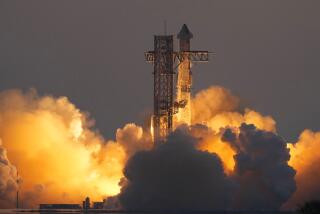SpaceX founder Elon Musk blames rocket failure on shoddy part
SpaceX founder Elon Musk said Monday that the company believes its rocket disintegrated last month after a small steel band purchased from a subcontractor snapped under pressure.
Musk said the investigation’s preliminary conclusions point to the 2-foot-long strut that was holding down one of many helium bottles on the rocket’s second stage, where the explosion occurred.
“This was a purchased part,” Musk said. “We just install it at SpaceX.”
But he added that he did not put all fault for the June 28 rocket failure on what appeared to be a shoddy part from a supplier. He said he believed that SpaceX employees may have become somewhat complacent about quality control because of the firm’s repeated successes in recent years.
When the company’s last rocket failed in 2008, he said, it had just 500 employees. Now SpaceX has 4,000 workers.
“Most people at the company today have only ever seen success,” Musk said. “When you’ve only ever seen success, you don’t fear failure quite as much.”
Before every launch, Musk said, he sends a companywide email asking employees to contact him immediately if they know of any reason to delay the flight — even if their manager would not approve.
“The 20th time I send that email it just seems like it’s Elon being paranoid again,” he said.
The Hawthorne company’s rockets have been grounded as its investigation continues into what caused the unmanned ship to break apart high above Florida’s coast. The Falcon 9 rocket was on its seventh mission of carrying supplies to the International Space Station.
Musk said Monday that with the probe’s early findings he now believes the failure will delay the company’s ambitious launch schedule by “only a few months.”
He said that SpaceX would now test every strut used on each rocket and not just depend on the subcontractor’s certification of their strength. He declined to name the strut supplier.
SpaceX has orders for almost 50 launches — including from NASA, the Air Force, foreign governments and commercial satellite companies. The launch work is worth more than $7 billion, the company said in recent congressional testimony.
Musk said he believes the delay in the launch schedule would cost the company “hundreds of millions, probably.”
But so far, no customer has left SpaceX for another launch provider, he said.
“Every one of our customers has been supportive,” he said.
At a July 10 congressional hearing, a NASA official said the Falcon 9 was carrying cargo worth $110 million when it broke up high off Florida’s coast. The cargo included equipment, a spacesuit, experiments, food and other supplies.
Musk said that he believes the cargo ship could have been saved if it had been equipped with software to deploy its parachutes in an emergency.
The company has already developed that kind of software for the ship it is building to shuttle astronauts to the space station. Musk said SpaceX now plans to add the software to future cargo missions.
SpaceX has hired a submarine to look for what may be left of the cargo ship, known as the Dragon, Musk said.
“It unfortunately hit the water quite hard,” he said, “and is at the bottom of the ocean.”
NASA is allowing SpaceX to do its own investigation into the failure. The agency says that one of its own employees also sits on the investigation team — allowing it to raise objections if it doesn’t agree with the company’s findings.
The Federal Aviation Administration and the National Transportation Safety Board also have employees on the team.
SpaceX manufactures its own rockets, engines and capsules at its factory near Los Angeles International Airport. But it also depends on hundreds of suppliers for parts.
The 1-inch-wide strut was securing a helium bottle in the liquid oxygen tank.
If the strut gave way as investigators believe, Musk said, the bottle would have shot to the top of the tank, leading to the rocket’s destruction.
Musk said that after engineers began to suspect the strut, SpaceX began testing the part’s strength. SpaceX tested an “enormous number” of the struts finding no problems, he said, until one broke at just one-fifth of the pressure it was certified to sustain.
He added that photos taken of the rocket before the launch show that SpaceX technicians appeared to have assembled the struts and helium bottles correctly.
“We’re obviously not going to use these particular struts” in the future, he said.
Follow me on Twitter @MelodyPetersen
More to Read
Inside the business of entertainment
The Wide Shot brings you news, analysis and insights on everything from streaming wars to production — and what it all means for the future.
You may occasionally receive promotional content from the Los Angeles Times.











